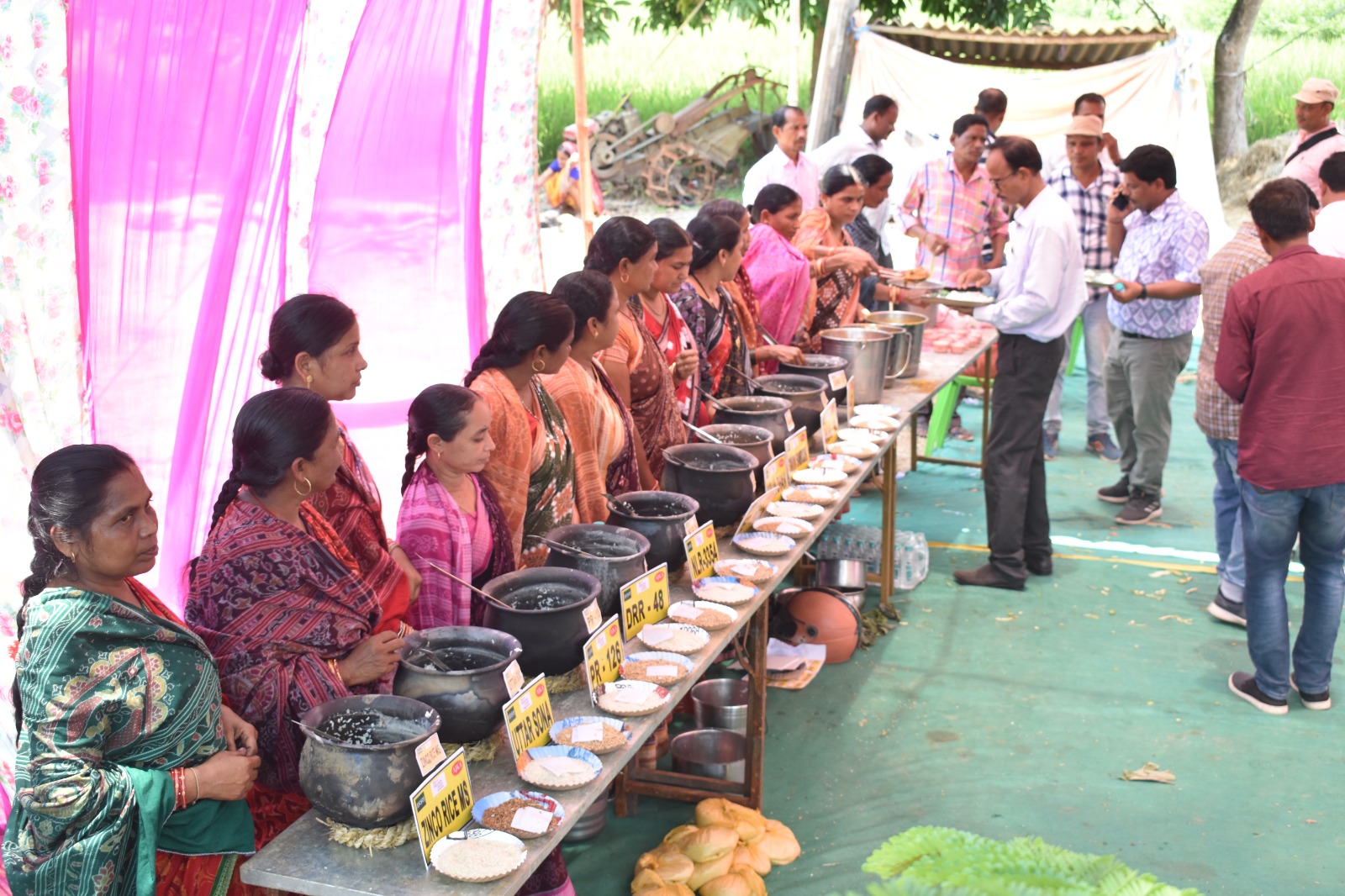IRRI initiates participatory research on cooking quality test for new varieties

Odisha, INDIA (15 May 2023)- In collaboration with the Government of Odisha, the International Rice Research Institute (IRRI) launched a participatory study on the cooking characteristics and sensory attributes of rice varieties on 10 May 2023 in Bargarh. The activity aims to help the participants assess the taste, texture, aroma, and appearance of rice varieties.
A total of 56 participants attended the cooking quality test, including men and women farmers from Odisha, local government members, village heads, district and Agriculture District Officer, Bargarh, Bijay Kumar Pattnayak; Deputy Project Director, Agriculture Technology Management Agency, Rabinarayan Senapati, and Assistant Agriculture Officer, Ms. Jyotsnamayee.
In 2022, IRRI conducted varietal cafeterias and on-farm trials to evaluate and validate the performance of a large number of newly released rice varieties through the National Breeding Program. Several varieties (25–30 novel products) were subjected to a thorough participatory evaluation and measurement in order to generate performance-based rankings. These classifications were based on the yield, yield-related parameters, and other observable characteristics of the rice plant.

To advance the result of the on-farm trials, the IRRI Seed System team, led by Dr. Swati Nayak, Mosharaf Hossain, and Dillip Kumar Rout, conceptualized a “new” experiment to assess various rice characteristics that define overall cooking quality, such as overall flavor, stickiness, elongation, water absorption, cooking time, aroma, and texture.
These are the characteristics, which cannot be measured or evaluated on-farm, require a more thorough evaluation following the harvesting and milling of cereals because they are essential for farm households to determine whether or not to adopt a variety and use it for their own consumption or for sale.
Several characteristics have the potential to generate “perception” barriers among farmers, including women in agricultural households because cooking quality-related characteristics can be influenced by cultural preferences. Moreover, the said characteristics can affect consumers' willingness to purchase and the necessary demand triggers among local market actors (millers, wholesalers, and retailers).
The team believes that it is critical to evaluate these cooking characteristics with the local farmers in order to obtain evidence, perception, and demand that go beyond laboratory-based grain quality analysis.

Under the close supervision of Mosharaf Hossain and Dillip Kumar Rout, and with the assistance of Sudam Sahu and Shantunu Dash, coordinators of Agrani Janakalyan Anusthan, ten of the highest-performing varieties from the previous year’s varietal trials and cafeterias were selected for the experiment.
Ten women farmers from the Maa Kaveri Women Self-Help Group from Ainlapli Village, urban and rural consumers were chosen to take part in a cooking quality evaluation.
Some of the results of the study include DRR Dhan 47 took the least time to cook while Zinco Rice MS and Uttarsona took the longest time. DRR Dhan 48 had very good elongation, good grain separation, and less stickiness. NLR 3354 also had good elongation. Zinco Rice MS was also reported to have more stickiness than the others.
Many of these varieties are already under evaluation through laboratory analysis for trait validations, which will provide comprehensive feedback to the breeders.

"With the immense support of the Government of Odisha, this type of research can generate a very strong impact loop for the acceptance and adoption of a variety in both the seed chain and the grain markets,” said Dr. Nayak, IRRI’s South Asia Lead for Seed Systems. “It is vital that farmer households’ and consumers' perceptions of cooking quality be taken into account during variety testing and evaluation systems.”
This advanced research, which extends the impact of IRRI's successful on-farm testing models ("lab-to-farm"), has now developed an initial "farm-to-consumer" roadmap to improve the impact of its breeding program.
Following the success and attention it gained from the local stakeholders and leaders, the IRRI Seed System team plans to scale this participatory approach to other locations in India.